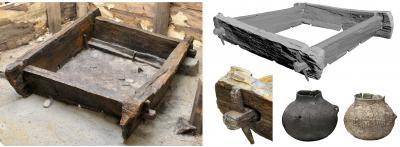Prehistoric farming communities in Europe constructed water wells out of oak timbers, revealing that these first farmers were skilled carpenters long before metal was discovered or used for tools. The research published December 19 in the open access journal PLOS ONE by Willy Tegel and colleagues from the University of Freiburg, Germany, contradicts the common belief that metal tools were required to make complex wooden structures.
The wooden water wells discovered in eastern Germany are over 7000 years old, and suggest that these early farmers had unexpectedly refined carpentry skills. "This early Neolithic craftsmanship now suggests that the first farmers were also the first carpenters", the study reports.

This image shows Neolithic wooden water wells.
(Photo Credit: Citation: Tegel W, Elburg R, Hakelberg D, Stauble H, Buntgen U (2012) Early Neolithic Water Wells Reveal the Worlds Oldest Wood Architecture. PLOS ONE 7(12):e51374. doi:10.1371/journal.pone.0051374)
These first Central European farmers migrated from the Great Hungarian Plain approximately 7,500 years ago, and left an archeological trail of settlements, ceramics and stone tools across the fertile regions of the continent, a record named Linear Pottery Culture (LBK). However, much of the lifestyle of these early settlers is still a mystery, including the climate they lived in and technology or strategies they used to cope with their surroundings. According to the study, the oak timbers analyzed in this study are also a new archive of environmental data preserved in the tree rings, which could tell an accurate, year-by-year story of the times these early settlers lived in.
Source: Public Library of Science